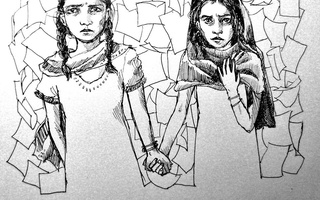Siddharth A. Kara, a Fellow with the Carr Center Program on Human Trafficking and Modern-Day Slavery, won the 2010 Frederick Douglass Book Prize for his book, “Sex Trafficking: Inside the Business of Modern Slavery.”
Yale University presents the award on an annual basis to the author of the best non-fiction book on slavery. Kara’s was the first book concerned with modern-day slavery to win the award.
“I think that it’s a significant milestone,” said Dr. Timothy P. McCarthy ’93, Director of the Carr Center’s Human Rights and Social Movements Program. “In awarding this prize to Siddharth, the Douglass Prize committee has acknowledged that slavery and trafficking are not a thing of the past.”
Kara left his investment-banking job to travel and research human trafficking of all kinds. He interviewed thousands of current and former slaves across 20 countries. “Sex Trafficking” is one of three books that Kara is writing as a result of this research.
According to the U.S. Department of State, one million children are exploited by the global commercial sex trade every year.
Kara said that over the course of the past ten years, people have become far more aware of issues of human trafficking.
Though international awareness of trafficking has risen, Kara feels that more serious analysis is required.
“The problem comes when the awareness-raising activities are sensationalistic and sometimes misleading.”
This lack of in-depth research is one of the reasons that Kara said he began his travels.
The book, however, is more than a study of the problem. Kara proposes tactics to more effectively combat human trafficking, including more proactive interventions, greater economic penalties, and certain protections for victims.
Kara sees human trafficking primarily as an economic phenomenon, driven by the ability to generate huge profits at almost no real cost or risk. “We have to invert that,” he said.
Ultimately, Kara feels that the solution to these problems can only come through a unified movement with stakeholders at every level of society. “The big challenge, of course, is that this is a global problem,” said McCarthy.
“Global social movements have a huge set of obstacles to overcome in organizing themselves.”
But even individuals can make a difference in contributing to the end of human trafficking, said Kara. He especially emphasized the importance of knowledge and advocacy at the university level, and the prospects of creating a unified grassroots movement.
Read more in News
UC Tickets Appeal To FreshmenRecommended Articles
-
SOFTBALL 2004: Captains CrunchIn the case of the Crimson softball co-captain rhyming duo of Sara and Kara, what’s good for the ear is
-
Profs Talk Econ of SlaveryProfessors and students discussed the deep connection between America’s history of human bondage and its economic ascendancy during a three-day conference at Harvard and Brown University entitled “Slavery’s Capitalism: A New History of American Economic Development.”
-
Students Publish Booklet on Slavery at HarvardIn the early days of Harvard, slaves played a role in the everyday life of the university. They worked in the homes of faculty and alumni, and later, they hid in the Warren House as part of the Underground Railroad.
-
 Addison’s ‘Walk’ a Trite but Effective Exploration of Exploitation
Addison’s ‘Walk’ a Trite but Effective Exploration of Exploitation -
Harvard's Exploitation of LaborDespite its massive wealth, Harvard has continued to exploit its workers throughout its history.
-
 Harvard and Slavery: Office Hours with Sven Beckert
Harvard and Slavery: Office Hours with Sven Beckert













